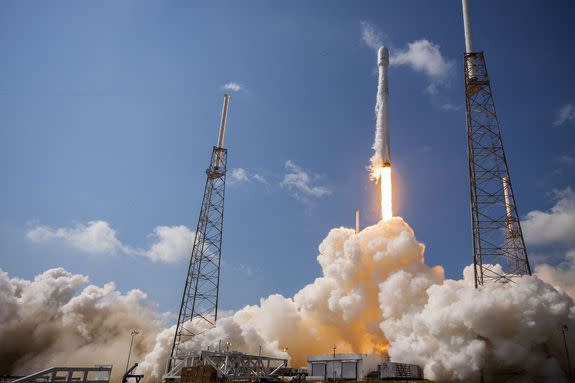Elon Musk's SpaceX absolutely needs its satellite internet business to work

SpaceX is betting big on its (currently non-operational) satellite internet business.
According to a report by the Wall Street Journal on Friday, Elon Musk's private spaceflight company hopes that its planned fleet of 4,425 satellites designed to deliver internet to locations around the world will bring in enough revenue to fund its goal of getting people to Mars.
In total, SpaceX is projecting that the internet end of its business will "bring in more than $30 billion in revenue by 2025," the Wall Street Journal said, citing SpaceX documents.
SEE ALSO: SpaceX reveals cause of September explosion
SpaceX is a company known for its ambitious and far-reaching goals. Instead of simply launching rockets the traditional way, Musk's company has changed the game. SpaceX is attempting to create a fleet of reusable rockets by landing the first stages of their Falcon 9s back on Earth after delivering satellites and other payloads to orbit. This is a clear departure from the typical use -it-and-lose-it way most launchers work.

Image: Spacex flickr
Because of that, it probably shouldn't come as a surprise that the company is planning to stretch itself even thinner by moving into another part of the space sector. However, that plan comes with some serious challenges.
The company will have an uphill battle if it wants to get the internet business up and running under its current timeframe, however.
At the moment, SpaceX is still figuring out how it will build and launch the initial 800 satellites in its constellation, and the company's Seattle-based satellite factory isn't up to full steam yet.
SpaceX did file an application with the Federal Communications Commission outlining its plans at the end of 2016.
"The system is designed to provide a wide range of broadband and communications services for residential, commercial, institutional, governmental and professional users worldwide," SpaceX wrote in a supplement to the application.
It may seem a little odd that SpaceX is hinging its big plans on satellite internet when the company has seemed to focus much of its energy on building a robust rocket building and launching business.
To understanding why this is the case, one just has to follow the money.
Where the space money is

Image: spacex/flickr
Instead of building a full fleet of internet-delivering satellites, why doesn't SpaceX just focus on what it knows how to do and launch rockets to space?
Well, to put it simply, that's not where the money is.
According to the Journal's reporting, the rocket launch industry as a whole "produces only $4.5 billion in total annual revenue."
"To me the importance that SpaceX is placing on satellite internet demonstrates their acknowledgement that launch revenues won't be enough to match their ambitions," Bill Ostrove, an aerospace and defense industry analyst at Forecast International told Mashable via email. He added:
SpaceX isn't alone in that sector of the space industry, however.
Another spaceflight company, OneWeb, is further along in its plan to eventually launch a fleet of 900 internet-delivering satellites to orbit. That company announced that it raised $1.2 billion in investor funding at the end of 2016, and it is getting ready to start manufacturing satellites in Florida.
Google and Facebook are also both interested in creating satellite internet businesses of their own.
Facebook's plans were set back when a SpaceX Falon 9 rocket exploded on its pad in September 2016, destroying the AMOS-6 satellite. The social network was planning to lease time on that spacecraft to test out how space-delivered internet worked in Sub-Saharan Africa.
Failed launches, lost revenue
That failed launch could also be at least part of the reason for some of SpaceX's less-than-ideal financial footing highlighted in the Wall Street Journal.
The September accident added to the company's losses after a 2015 accident and subsequent delays "contributed to a quarter-billion dollar annual loss and a 6 percent drop in revenue, after two years of surging sales and small profits," the Wall Street Journal said.
SpaceX's launch failures may not be the only contributors to the company's shaky bottom line.
The very things that makes SpaceX special — its ambitions and tendency to stretch itself thin — may also be factors.
"SpaceX is involved in so many different projects, so I wonder if costs are going up. Production is higher as they are doing more launches," Ostrove said.
"But they're also spending more money developing a human-rated Dragon, the Red Dragon, the satellite constellation, and Mars settlement plans. Maybe none of those things by themselves are making a big difference, but combined, they may be affecting profits."

